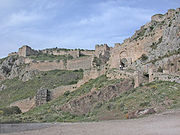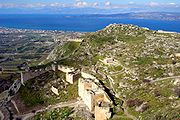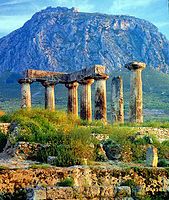
Acrocorinth
Encyclopedia



Acropolis
Acropolis means "high city" in Greek, literally city on the extremity and is usually translated into English as Citadel . For purposes of defense, early people naturally chose elevated ground to build a new settlement, frequently a hill with precipitous sides...
of ancient Corinth
Ancient Corinth
Corinth, or Korinth was a city-state on the Isthmus of Corinth, the narrow stretch of land that joins the Peloponnesus to the mainland of Greece, roughly halfway between Athens and Sparta. The modern town of Corinth is located approximately northeast of the ancient ruins...
, is a monolithic rock overseeing the ancient city of Corinth, Greece
Ancient Greece
Ancient Greece is a civilization belonging to a period of Greek history that lasted from the Archaic period of the 8th to 6th centuries BC to the end of antiquity. Immediately following this period was the beginning of the Early Middle Ages and the Byzantine era. Included in Ancient Greece is the...
. "It is the most impressive of the acropoleis
Acropolis
Acropolis means "high city" in Greek, literally city on the extremity and is usually translated into English as Citadel . For purposes of defense, early people naturally chose elevated ground to build a new settlement, frequently a hill with precipitous sides...
of mainland Greece," in the estimation of George Forrest. Acrocorinth was continuously occupied from archaic times to the early 19th century. The city's archaic acropolis, already an easily defensible position due to its geomorphology, was further heavily fortified during the Byzantine Empire
Byzantine Empire
The Byzantine Empire was the Eastern Roman Empire during the periods of Late Antiquity and the Middle Ages, centred on the capital of Constantinople. Known simply as the Roman Empire or Romania to its inhabitants and neighbours, the Empire was the direct continuation of the Ancient Roman State...
as it became the seat of the strategos
Strategos
Strategos, plural strategoi, is used in Greek to mean "general". In the Hellenistic and Byzantine Empires the term was also used to describe a military governor...
of the thema of Hellas
Hellas (theme)
The Theme of Hellas was a Byzantine military-civilian province located in southern Greece. The theme encompassed parts of Central Greece, Thessaly and, until circa 800, the Peloponnese...
and later of the Peloponnese
Peloponnese (theme)
The Theme of the Peloponnese was a Byzantine military-civilian province encompassing the Peloponnese peninsula in southern Greece. It was established in circa 800, and its capital was Corinth.-History:...
. It was defended against the Crusaders
Fourth Crusade
The Fourth Crusade was originally intended to conquer Muslim-controlled Jerusalem by means of an invasion through Egypt. Instead, in April 1204, the Crusaders of Western Europe invaded and conquered the Christian city of Constantinople, capital of the Eastern Roman Empire...
for three years by Leo Sgouros
Leo Sgouros
Leo Sgouros was a Greek independent lord in the northeastern Peloponnese in the early 13th century. The scion of the magnate Sgouros family, he succeeded his father as hereditary lord in the region of Nauplia...
.
Afterwards it became a fortress of the Frankish
Frangokratia
The Frankokratia or Frangokratia , also known as Latinokratia is the period in Greek history after the Fourth Crusade , when a number of Western European Crusader states were established in Greece, on the territory of the dissolved Byzantine Empire .The term derives from the fact that Orthodox...
Principality of Achaea
Principality of Achaea
The Principality of Achaea or of the Morea was one of the three vassal states of the Latin Empire which replaced the Byzantine Empire after the capture of Constantinople during the Fourth Crusade. It became a vassal of the Kingdom of Thessalonica, along with the Duchy of Athens, until Thessalonica...
, the Venetians and the Ottoman Turks. With its secure water supply, Acrocorinth's fortress was used as the last line of defense in southern Greece because it commanded the Isthmus of Corinth
Isthmus of Corinth
The Isthmus of Corinth is the narrow land bridge which connects the Peloponnese peninsula with the rest of the mainland of Greece, near the city of Corinth. The word "isthmus" comes from the Ancient Greek word for "neck" and refers to the narrowness of the land. The Isthmus was known in the ancient...
, repelling foes from entry into the Peloponnese peninsula. Three circuit walls
Defensive wall
A defensive wall is a fortification used to protect a city or settlement from potential aggressors. In ancient to modern times, they were used to enclose settlements...
formed the man-made defense of the hill. The highest peak on the site was home to a temple
Temple
A temple is a structure reserved for religious or spiritual activities, such as prayer and sacrifice, or analogous rites. A templum constituted a sacred precinct as defined by a priest, or augur. It has the same root as the word "template," a plan in preparation of the building that was marked out...
to Aphrodite
Aphrodite
Aphrodite is the Greek goddess of love, beauty, pleasure, and procreation.Her Roman equivalent is the goddess .Historically, her cult in Greece was imported from, or influenced by, the cult of Astarte in Phoenicia....
which was converted to a church, and then became a mosque
Mosque
A mosque is a place of worship for followers of Islam. The word is likely to have entered the English language through French , from Portuguese , from Spanish , and from Berber , ultimately originating in — . The Arabic word masjid literally means a place of prostration...
. The American School's
American School of Classical Studies at Athens
The American School of Classical Studies at Athens is one of 17 foreign archaeological institutes in Athens, Greece.-General information:...
Corinth Excavations
Corinth Excavations
The Corinth Excavations by the American School of Classical Studies at Athens began in 1896 and have continued with little interruption until today. Restricted by the modern village of Ancient Corinth, which directly overlies the ancient city, the main focus of School investigations has been on the...
began excavations on it in 1929. Currently, Acrocorinth is one of the most important medieval castle sites of Greece
Greece
Greece , officially the Hellenic Republic , and historically Hellas or the Republic of Greece in English, is a country in southeastern Europe....
.
.jpg)
Pausanias (geographer)
Pausanias was a Greek traveler and geographer of the 2nd century AD, who lived in the times of Hadrian, Antoninus Pius and Marcus Aurelius. He is famous for his Description of Greece , a lengthy work that describes ancient Greece from firsthand observations, and is a crucial link between classical...
, Briareus, one of the Hecatonchires, was the arbitrator in a dispute between Poseidon
Poseidon
Poseidon was the god of the sea, and, as "Earth-Shaker," of the earthquakes in Greek mythology. The name of the sea-god Nethuns in Etruscan was adopted in Latin for Neptune in Roman mythology: both were sea gods analogous to Poseidon...
and Helios
Helios
Helios was the personification of the Sun in Greek mythology. Homer often calls him simply Titan or Hyperion, while Hesiod and the Homeric Hymn separate him as a son of the Titans Hyperion and Theia or Euryphaessa and brother of the goddesses Selene, the moon, and Eos, the dawn...
, between the sea and the sun: his verdict was that the Isthmus of Corinth belonged to Poseidon and the acropolis of Corinth (Acrocorinth) to Helios
Helios
Helios was the personification of the Sun in Greek mythology. Homer often calls him simply Titan or Hyperion, while Hesiod and the Homeric Hymn separate him as a son of the Titans Hyperion and Theia or Euryphaessa and brother of the goddesses Selene, the moon, and Eos, the dawn...
.
The Upper Pirene spring is located within the encircling walls. "The spring, which is behind the temple, they say was the gift of Asopus
Asopus
Asopus or Asôpos is the name of four different rivers in Greece and one in Turkey. In Greek mythology, it was the name of the gods of those rivers.-The rivers in Greece:...
to Sisyphus
Sisyphus
In Greek mythology Sisyphus was a king punished by being compelled to roll an immense boulder up a hill, only to watch it roll back down, and to repeat this throughout eternity...
. The latter knew, so runs the legend, that Zeus had ravished Aegina
Aegina
Aegina is one of the Saronic Islands of Greece in the Saronic Gulf, from Athens. Tradition derives the name from Aegina, the mother of Aeacus, who was born in and ruled the island. During ancient times, Aegina was a rival to Athens, the great sea power of the era.-Municipality:The municipality...
, the daughter of Asopus, but refused to give information to the seeker before he had a spring given him on the Acrocorinthus."

